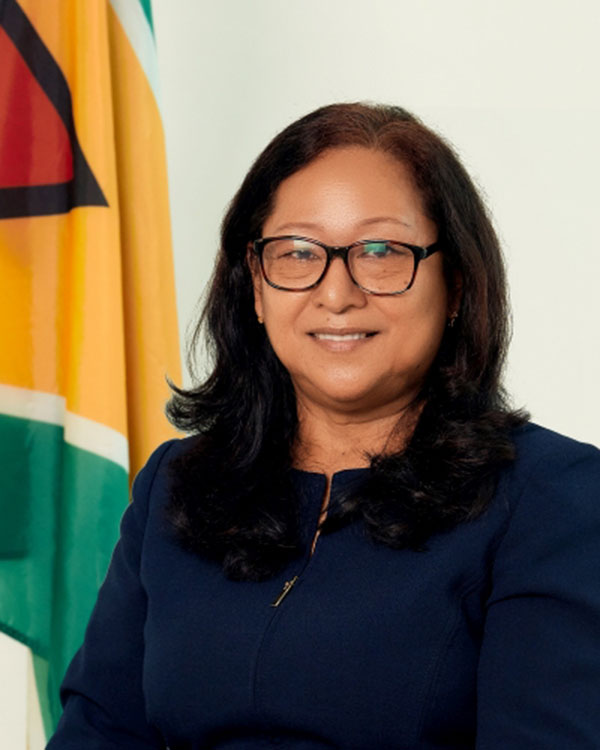In an ever widening rift, the government’s appointee on the affairs of Indigenous people and the non-governmental Amerindian Peoples Association (APA) traded accusations over comments made at and about the recent National Toshaos Committee (NTC) Conference at the Arthur Chung Conference Centre at Liliendaal, Georgetown.
Minister of Amerindian Affairs Pauline Sukhai accused the APA of undermining the significant progress at the NTC conference in a campaign driven by political motives rather than genuine concern for Amerindian development. But the NGO, maintaining that it is apolitical, has condemned her silence on the government’s continued trampling on the rights of Indigenous peoples.
“The APA maintains that it is an independent, non-political, non-partisan organisation that has always prioritised the well-being of Indigenous communities. Any suggestion that we are ‘in bed with the opposition’ is a gross mischaracterisation designed to undermine our credibility and distract from the legitimate concerns we raise on behalf of our people. Our constructive criticism of the government’s actions stems from a genuine commitment to justice, equality, and the protection of Indigenous rights — not from any political affiliation,” the APA said yesterday.
It not only debunked Sukhai’s accusation but similar claims by President Irfaan Ali and Vice President Bharrat Jagdeo earlier this week.
In a strongly worded statement on Thursday, Minister Sukhai criticised the APA for what she described as a deliberate attempt to divert attention from the substantive and solution-oriented dialogue taking place between Amerindian leaders and the government. Sukhai claimed that the APA’s actions were aimed at sabotaging the unity and progress being achieved at the conference, alleging that the APA’s criticisms were a misrepresentation of the government’s efforts.
Central to the dispute is a recent speech by President Ali, which the APA condemned as inaccurate and misleading. In a press statement circulated on August 21st,2024, the APA said that President Ali’s portrayal of the NTC’s history was incomplete and overlooked the APA’s crucial role in supporting the inaugural conference in 2003. The APA has emphasised that its support for the first NTC meeting was instrumental in establishing a platform for Indigenous voices, a fact, which it argued has been unfairly overshadowed by the current administration.
The APA also highlighted ongoing issues with the NTC Conference’s format and agenda, arguing that recent sessions have been dominated by government influence. It criticised the lack of transparency and inclusivity in the preparation of conference agendas and expressed concern that traditional Indigenous governance structures, such as district councils, were being undermined by the government’s stance.
Moreover, the APA challenged the government’s record on funding and development initiatives for Amerindian communities. Despite significant financial allocations from carbon credit sales, the APA accused the government of obstructing access to these funds, alleging inefficiency in the distribution and utilisation of the funds.
The APA has also taken issue with the portrayal of Indigenous people’s historical advancements, arguing that the government’s narrative failed to acknowledge any earlier strides made. The APA called for a more accurate and respectful representation of Indigenous history and contributions.
In her statement, Sukhai also accused the APA of portraying nothing short of hypocrisy in its claims to champion the cause of Amerindians, adding that it boasted a track record that was, in reality, “stellar only in its ability to deny our first peoples the right to access funding critical for the development of their villages”.
According to Sukhai, despite the historic allocation of $4.7 billion in 2023 from the sale of carbon credits, representing the single largest financial injection into Amerindian communities ever, the APA continued to oppose and “obstruct, even as this year’s allocation has increased by 26.5% and those funds are being disbursed to uplift the very communities they purport to love.
“The truth is glaring. The APA is solely concerned with positioning itself in a self-appointed, self-righteous role that allows them to attract donor financing by manufacturing a crisis, by creating a narrative of need that justifies their continued existence.”
She also accused the APA of absenting itself from the Low Carbon Development Strategy (LCDS) Communications Sub-Committee meetings despite being requested to provide solutions to challenges such as identifying translators fluent in local languages and as such left the crucial work to others.
Appalling
Firing back, the organisation yesterday said it was appalling that the government spends so much of its time bashing the APA and attempting to dissuade Indigenous people from being associated with them.
“Our work is a testament to our commitment to the development of Indigenous peoples, and we are pleased that the government recognises this and is trying to take credit for it. We must inform the Minister of Amerindian Affairs Pauline Sukhai that in a series of mediation meetings, the APA brokered the agreement between Akawini and Wakapau over their land dispute…,” the APA’s statement said.
It reminded the minister that both the Inter-American Commission on Human Rights (IACHR) in the case of Isseneru and Chinese Landing and the United Nations Committee on the Elimination of Racial Discrimination (UN CERD) in the case of Chinese Landing have called out her government for violating the rights of Indigenous peoples.
“Yet she remains silent, which begs the question of who the minister represents. Throughout the NTC Conference, neither the minister nor her government sought to work with the Chinese Landing and Isseneru communities to resolve their issues. Instead, the minister has washed her hands of the responsibility to assist the Akawaio and Carib peoples of these communities,” the APA said.
It pointed out that Chinese Landing was left to bear the brunt of the government’s missteps in the issuance of mining blocks in the community and asked whether the government did not see the children suffering in that community.
“Does the Amerindian Affairs Minister not see the gross and glaring violations of the rights of the Carib Indigenous peoples in that community?,” the APA asked. “The APA has never abandoned an Indigenous community that reached out for assistance, and we will continue our work despite the government’s demonisation of the association.”
It added that Indigenous people need to be respected and have the promises to them fulfilled. Additionally access to lands, resources, protections under the law and basic social services are not a courtesy, the APA pointed out, but the right of the Indigenous communities.
“We maintain that the Constitution of Guyana Sec 40 (1) (b) guarantees the fundamental individual rights and freedoms of conscience, of expression and of assembly and association,” it stated. As a membership organisation, it comprises members from various political parties, including the governing party, the APA said.








